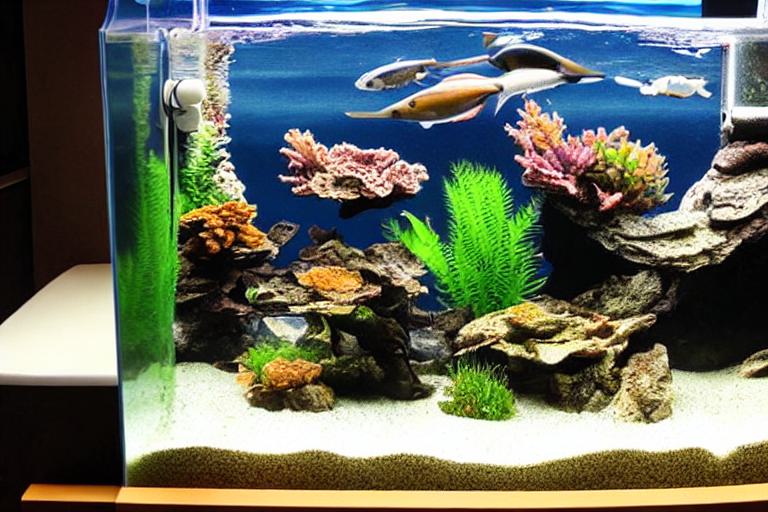An aquarium can be a beautiful addition to any home, providing both aesthetic value and the opportunity to observe marine life up close. But as with any pet, there is a certain amount of care that must be taken to ensure the health and well-being of the animals involved. One potential hazard to fish in an aquarium is over-filtering. While filtration is necessary to maintain water quality and prevent the build-up of toxins, too much filtration can put stress on fish and even lead to death. In this article, we’ll explore the risks and effects of over-filtering an aquarium, as well as some tips on how to avoid this problem.
Over-Filtering an Aquarium
An aquarium can be over-filtered, and there are risks and effects associated with this. It can also cause oxygen depletion and stress on fish. Over-filtering can cause an increase in nitrates and phosphates, which can lead to algae growth.
To avoid over-filtering, it is important to maintain a proper cleaning schedule for your filter. Over-filtering can be caused by using too much filtration, or by not cleaning the filter properly.

Biological vs. Mechanical Filtration
This type of filtration is important for preventing clogging and maintaining water clarity. Biological filtration is the process of removing waste and toxins from water using beneficial bacteria. This type of filtration is important for maintaining water quality and preventing the spread of disease. Mechanical filtration is the process of removing solid particles from water using a filter.
Biological filtration is necessary for breaking down waste and removing toxins, while mechanical filtration is necessary for removing solid particles and keeping water clear. While both biological and mechanical filtration are important for keeping an aquarium clean and healthy, they serve different purposes.
In freshwater aquariums, over-filtering can cause oxygen depletion and water quality issues. Over-filtering can be a problem in both freshwater and saltwater aquariums. In saltwater aquariums, over-filtering can cause coral bleaching and other problems.
If you are unsure about how to properly filter your aquarium, it is best to consult with a professional. To avoid over-filtering, it is important to choose the right filter for your aquarium and to clean it regularly.
Can a Filter Be Too Strong for a Fish Tank?
It’s a common misconception that an aquarium can be over-filtered. While it’s true that a filter is necessary for a healthy fish tank, a filter that is too strong can actually be harmful to your fish.
In addition, a strong filter can also cause your fish to become trapped in corners or against the glass, where they can be injured or killed. A filter that is too strong can create a current in the tank that is too strong for your fish to swim against. This can cause your fish to become stressed and even lead to death.
First, you can reduce the flow of water going into the filter. If you’re concerned that your filter is too strong, there are a few things you can do to mitigate the risk. Finally, you can make sure that there are plenty of hiding places and plants in your tank for your fish to take refuge from the filter’s flow. Second, you can add a baffle to the filter to reduce the flow of water.
By following these simple tips, you can ensure that your fish tank is healthy and safe for your fish.
Is It Okay to Have 2 Filters in an Aquarium?
If you have an aquarium, you may be wondering if it’s okay to have two filters. While there are benefits to having two filters, there are also some risks and effects to consider.
Benefits of having two filters include increased filtration and better water quality. Two filters also provide redundancy in case one filter fails.
Risks and effects of having two filters include increased costs, more maintenance, and the potential for one filter to overwhelm the other.
If you’re considering adding a second filter to your aquarium, weigh the pros and cons carefully to decide if it’s the right decision for you.
Pros of Having Two Filters
First, having two filters can help to keep the water cleaner for longer periods of time. Third, having two filters can help to reduce the amount of work that the aquarium owner has to do in terms of cleaning the aquarium. An aquarium can be over-filtered, but there are some pros to having two filters. Second, having two filters can help to keep the aquarium inhabitants healthier by providing them with cleaner water.
Cons of Having Two Filters
While there are many benefits to having two filters in an aquarium, there are also some drawbacks. One of the main cons is that it can be more difficult to keep the water clean. With two filters, there is twice the chance that one of them will become clogged or dirty, and this can make it harder to maintain water quality.
Another downside to having two filters is that they can sometimes work against each other. This can also lead to stress and even death in some cases. If one filter is set to a higher flow rate than the other, the water can become turbulent and make it difficult for fish to swim.
Finally, having two filters can be more expensive than just having one. Not only do you have to purchase two filters, but you also have to maintain them both, which can add up over time.
How Many Times Per Hour Should You Filter Your Aquarium?
Aquariums should be filtered at least once per hour, but no more than three times per hour. Over-filtering can cause water quality problems and stress fish.
Sources
An aquarium can be over-filtered by using too much filtration media, running the filter for too long, or using a filter that is too powerful. Over-filtering can cause water quality problems and stress fish.
If an aquarium is over-filtered, it can cause the water to become cloudy and the fish may become stressed. The filter may also remove too much of the beneficial bacteria that help to keep the aquarium clean.
To avoid over-filtering, it is important to choose the right size and type of filter for your aquarium. You should also only run the filter for the amount of time recommended by the manufacturer.
Frequently Asked Questions
1. What is over-filtration?
2. What are the risks of over-filtration?
3. What are the effects of over-filtration?
4. How can I tell if my aquarium is over-filtered?
5. What can I do to prevent over-filtration?
6. How can I fix an over-filtered aquarium?
1. Over-filtration occurs when an aquarium filter is too powerful for the size of the tank, causing the water to cycle through the filter too quickly.
2. The risks of over-filtration include decreased water quality, increased stress on fish, and potentially damaging the filter itself.
3. The effects of over-filtration can be seen in water that is cloudy or has a strong chemical smell, as well as fish that appear to be gasping for air or swimming erratically.
4. To determine if your aquarium is over-filtered, look for signs of stress in your fish and test the water quality. If the water is cloudy or has a strong odor, it is likely that the aquarium is over-filtered.
5. To prevent over-filtration, choose a filter that is appropriate for the size of your aquarium and do not over-clean the filter media.
6. If your aquarium is over-filtered, you can reduce the flow rate of the filter or add more media to the filter to slow down the filtration process.
Final thoughts
An aquarium can be over-filtered, and this can have a number of different effects. The most common effect is that the water will become too clean and the fish will not be able to thrive. This can also lead to problems with the filter itself, as it can become clogged and ineffective. Over-filtering can also cause the water to become too oxygenated, which can be harmful to the fish.
